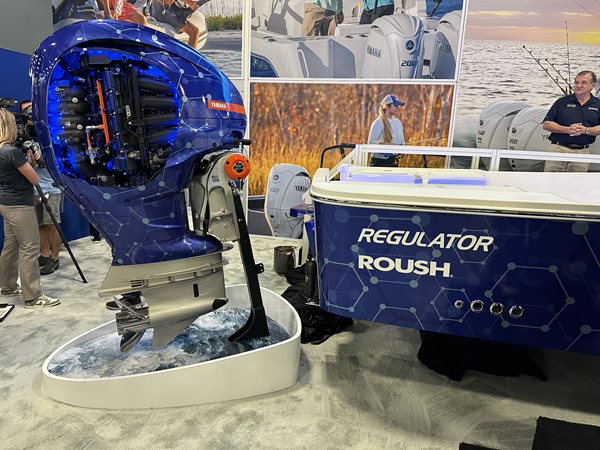
Miami, FL | February 14, 2024
Yamaha Motor Corporation, U.S.A. today unveiled the world’s first hydrogen-powered outboard for recreational boats along with a prototype fuel system integrated into a vessel that the company plans to further refine for testing later this year. The effort is part of Yamaha’s strategy to achieve carbon neutrality: deploying multiple technology solutions.
Yamaha joined forces with Roush to develop the fuel system to power the new outboard and collaborated with long-time boat builder partner Regulator Marine to build a boat suitable for testing the prototype outboard. Together, the companies plan to begin testing the protype for viability on the water in the summer of 2024.
“Yamaha is exploring all possibilities to achieve carbon neutrality, and we’ve made commitments for our operations to be carbon neutral by 2035 and our products to become carbon neutral by 2050. That goal within the marine market can only be reached through an approach that leverages multiple solutions. We believe hydrogen is a viable method of achieving these goals,” said Ben Speciale, President, Yamaha U.S. Marine Business Unit. “Yamaha wants to be a leader in this space, and we encourage others in the marine industry to become involved as we look for ways to build infrastructure and new policy around innovations.”
By working with Roush on the fuel system engineering, Yamaha gains the benefit of more than two decades of hydrogen systems integration and research.
“When you look at Roush’s history with hydrogen, it ranges from land speed record vehicles to spacecraft. A lot of that knowledge we’ve acquired over the years we are now applying directly to this Yamaha project,” said Matt Van Benschoten, Vice President, Advance Engineering, Roush. “We are the fuel systems integrator, responsible for fuel systems designs, all of the specifications development, physical integration, safety system analysis as well as testing and development. Yamaha is trying to determine if hydrogen can successfully be used in this market, and I think we will find out the answer is ‘yes.’”
Regulator Marine built a hull based on the 26XO and modified it to accommodate the hydrogen tanks necessary to power the new outboard. Together, Yamaha, Regulator and Roush displayed the boat hull, fuel system and outboard to demonstrate how hydrogen could work as a possible fuel source in a marine environment. Also, the effort allows engineers to begin the process of determining marine standards for the use of hydrogen in vessels.
“If we don’t look for a new source, we won’t find a new source. Innovation starts by asking questions. It creates a little angst, but at the end of the day good stuff comes out of innovation,” said Joan Maxwell, President, Regulator Marine. “In the future, as we design boats, if this proves what we think it will, it could be very possible that we are designing hulls around these hydrogen fuel tanks.”
“Through our relationship with Regulator Marine, we have the ability to test our prototype in a premium boating environment that reflects Yamaha’s brand position, and we have the ability to lead the way in the development of hydrogen as a fuel source in marine environments,” continued Speciale. “We’re excited to watch this project develop and look forward to taking the next steps.”
Yamaha announced the hydrogen outboard project last December. Further demonstrating the company’s commitment to a multi-technology approach to carbon neutrality, Yamaha recently announced plans to acquire all shares of electric outboard company Torqeedo.® In addition, Yamaha continues to promote the use of sustainable fuels within internal combustion outboard engines as another alternative. Please visit yamahamarinemedia.com for images and more information about the new hydrogen-powered outboard and fuel system.
A recent, first-of-its-kind study commissioned by the International Council of Marine Industry Associations (ICOMIA) entitled The Pathways to Decarbonisation for the Recreational Marine Industry, validates Yamaha’s approach to carbon neutrality, revealing a multi-plan approach is the best way to continue the decarbonization of recreatinoal boating. Through the study, leading global engineering consulting firm, Ricardo plc, investigated propulsion technologies across nice common recreatinoal watercraft to compare the imact of lifetime global greenhouse gas (GHG) emissions, financial costs, usability, performance, range and ifrastructure implications.
Due to the unique water environment of boats, the study found there is no “one-size-fits-all” solution, and instead recommends a portfolio of technologies to continue the reductino of carbon emissions within the recreational boating industry including a combination of elecric, hybrid, sustainable fuel and internal combustions applications.
Recreational boats, which depend on clean water and preserved environments, account for less than 0.1i] percent of (GHG) emmisions, specifically 0.7[ii] percent of transportation carbon dioxide (CO2) emissions in the United States and 0.4 percent[iii] of transportation CO2 emissions in Europe. Due to concentrated efforts within the marine industry, in the last two decades, the U.S. recreational marine industry alone has decreased marine engine emissions by more than 90 percent and increased fuel efficiency by more than 40 percent. Yamaha remains at the forefront of these efforts. Beyond this progress, the global recreational marine industry remains committed to leading conservation efforts that protect the natural marine environment and identifying ways to expand its collective efforts. To learn more, visit PropellingOurFuture.com.
For almost 50 years, Roush has been widely recognized for providing innovative engineering, testing, prototyping and manufacturing services to the advanced mobility, aerospace, defense and theme park industries. Roush is unique in its ability to leverage services across the complete product development cycle, solving customers’ most complex challenges and accelerating critical product launch targets.
Born and built to last in Edenton, North Carolina since 1988, Regulator boats are tested against the challenging conditions of the Outer Banks and delivered to locations throughout the U.S. and abroad. As manufacturers of premiere offshore sportfishing boats ranging from the Regulator 23 to the Regulator 41, as well as the new XO Series of center console crossovers, Regulator designs and engineers boats for the most discriminating anglers in the world with a “no-compromise” philosophy for a Legendary Ride. Visit www.regulatormarine.com for details and join the offshore fun @regulatormarine on Facebook and Instagram.
Yamaha U.S. Marine Business Unit, based in Kennesaw, Ga., markets and sells marine outboard motors ranging in size from 2.5 to 450 horsepower. It also engineers, manufactures, markets and sells boat control systems, IoT control devices, fiberglass, jet-drive sport boats ranging from 19 to 27 feet, and personal watercraft. The unit includes the manufacturing divisions of Yamaha Marine Systems Co., Inc., including Kracor of Milwaukee (rotational molding), Bennett Marine of Deerfield Beach, Fla. (trim tabs), and Yamaha Marine Precision Propellers of Indianapolis (stainless steel propellers). Yamaha U.S. Marine Business Unit is a division of Yamaha Motor Corporation, U.S.A., based in Cypress, Calif.
iU.S. Environmental Protection Agency (EPA),https://www.epa.gov/ghgemissions/global-greenhouse-gas-emissions-data
ii U.S. EPA, Greenhouse Gas Explorer CSV File Download 1990–2020, “Greenhouse gas emissions from ships and boats in the United States”, 20 April 2023, https://cfpub.epa.gov/ghgdata/inventoryexplorer/#allsectors/allsectors/allgas/econsect/all
iii Panteia, TNO and Emisia, “Review study on the Recreational Craft Directive 2013/53/EU”, 15 September 2021, https://single-market-economy.ec.europa.eu/system/files/2021-11/Final%20Report%20Review%20Study%20on%20the%20Recreational%20Craft%20Directive%202013%2053%20EU.pdf
View source article here.
